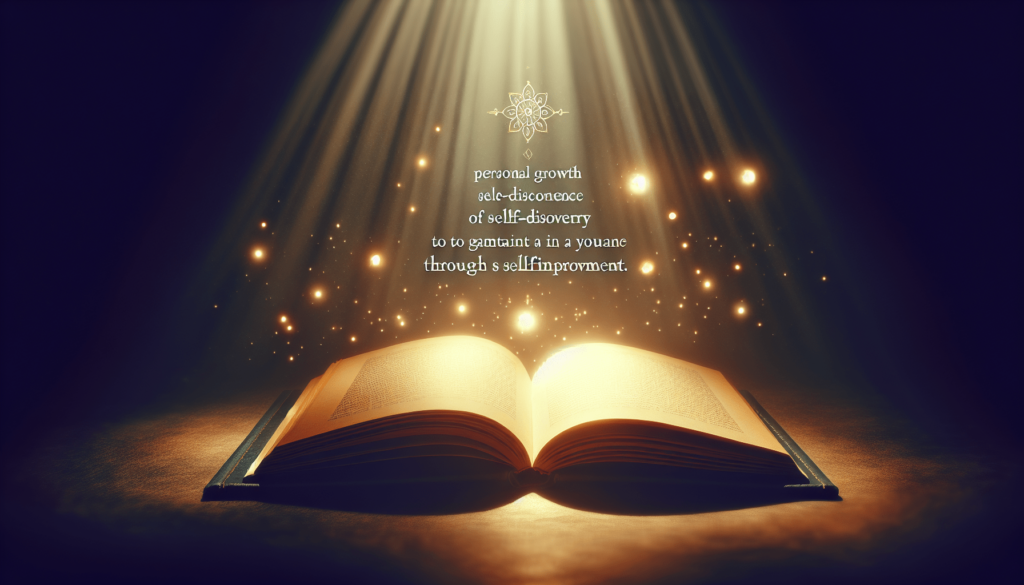
Are you ready to unlock your full potential and embark on a journey of personal growth? Look no further than the captivating world of books, where the keys to self-discovery and personal development await. Delve into the realms of psychology, self-help, and personal development literature and uncover the power within you. Through the pages of these insightful reads, you will find valuable tools, perspectives, and knowledge that will empower you to become the best version of yourself. So grab a book, dive into its pages, and let the transformation begin.
Understanding Personal Development
Definition and importance of personal development
Personal development refers to the conscious effort of improving oneself in various aspects of life, including personal growth, self-awareness, and enhancing skills and abilities. It is a lifelong journey towards self-improvement and self-actualization. Personal development encompasses emotional, mental, physical, and spiritual well-being. By investing in personal development, you can enhance your quality of life, relationships, career prospects, and overall happiness.
Benefits of personal development
Engaging in personal development has numerous benefits. It empowers you to take control of your life and make positive changes. It increases self-confidence and self-esteem, providing the tools you need to overcome obstacles and challenges. Personal development also helps you develop a growth mindset, enabling you to view setbacks as opportunities for learning and growth. It enhances your resilience, emotional intelligence, and ability to manage stress. Moreover, personal development expands your knowledge, broadens your perspective, and fosters personal fulfillment and satisfaction.
The role of books in personal development
Books are invaluable resources for personal development. They serve as guides, mentors, and sources of inspiration. Books offer a wealth of knowledge, wisdom, and insights from experts in different fields. They provide practical techniques, strategies, and exercises to help you grow, change, and achieve your goals. Moreover, books allow you to explore different perspectives, challenge your beliefs, and expand your understanding of the world. They provide solace, motivation, and a sense of connection. Books are powerful tools that can ignite transformation and facilitate personal development.
Choosing the Right Books
Identifying your personal development goals
Before delving into the world of books for personal development, it is essential to identify your specific goals and areas of interest. Reflect on what aspects of your life you wish to improve or change. Are you seeking personal growth, career advancement, better relationships, or enhanced well-being? Knowing your goals will help you focus your reading and select the most relevant books that address your unique needs.
Researching and selecting reputable book recommendations
With countless books on personal development available, it is crucial to research and select reputable sources to find the best recommendations. Look for respected authors, experts in their field, and books that have garnered positive reviews and feedback. Online platforms, such as Goodreads or book blogs, can provide valuable insights and recommendations. Additionally, seek recommendations from trusted friends, mentors, or personal development communities.
Considering different formats (e.g., print, e-books, audiobooks)

When choosing books for personal development, consider different formats that cater to your preferences and lifestyle. Traditional print books offer the tangible experience of flipping pages and underlining passages. E-books provide convenience and accessibility, allowing you to carry an entire library in your pocket. Audiobooks enable multitasking and hands-free learning, ideal for busy individuals or those who prefer auditory learning. Choose a format that aligns with your learning style and fits seamlessly into your routine.
Popular Books for Personal Development
Psychology classics: Freud, Jung, and Adler
Psychology classics written by influential figures like Sigmund Freud, Carl Jung, and Alfred Adler offer profound insights into human behavior, motivations, and the workings of the mind. These foundational texts delve deep into the realms of psychoanalysis, archetypes, and psychological theories. Reading these works allows you to gain a comprehensive understanding of the human psyche and broaden your perspective on personal development.
Contemporary self-help authors: Tony Robbins, Brené Brown
Contemporary self-help authors like Tony Robbins and Brené Brown have made a significant impact in the field of personal development. Their books provide practical strategies, tools, and inspiring stories that motivate and empower readers. Tony Robbins’ books focus on unleashing personal power, goal-setting, and overcoming limitations, while Brené Brown explores vulnerability, courage, and embracing imperfections. These authors offer relatable and actionable advice for personal growth.
Entrepreneurship and leadership books: Dale Carnegie, Simon Sinek
Books on entrepreneurship and leadership provide valuable insights into building successful businesses, effective communication, and inspiring others. Dale Carnegie’s timeless classic “How to Win Friends and Influence People” teaches interpersonal skills, networking, and influence. Simon Sinek’s “Start with Why” explores the power of purpose and passion in leadership. These books are valuable resources for personal development, whether you aspire to be an entrepreneur or enhance your leadership skills within your profession or personal life.
Spirituality and mindfulness: Eckhart Tolle, Thich Nhat Hanh
Books on spirituality and mindfulness offer guidance and practices to cultivate inner peace, presence, and self-awareness. Eckhart Tolle’s “The Power of Now” and Thich Nhat Hanh’s “The Miracle of Mindfulness” provide profound teachings on living in the present moment and finding joy in everyday experiences. These books inspire personal transformation, inner reflection, and a deep connection to oneself and the world around us.
Practical Techniques and Exercises
Journaling prompts for self-reflection
Journaling is a powerful tool for self-reflection and personal growth. Writing down your thoughts, feelings, and experiences can help you gain clarity, identify patterns, and explore your emotions. Use journaling prompts to guide your reflection, such as “What are my strengths and weaknesses?” or “What are my core values and how can I align my actions with them?” Regular journaling can deepen self-awareness, facilitate personal development, and provide a space for self-expression.
Meditation and mindfulness practices
Incorporating meditation and mindfulness practices into your daily routine can bring profound benefits to personal development. These practices cultivate present-moment awareness, reduce stress, and enhance focus and concentration. Start with short periods of meditation each day, focusing on your breath or a specific mantra. Engaging in mindfulness during daily activities, such as eating or walking, can also promote a sense of calm and connection. These techniques enhance self-awareness, emotional regulation, and overall well-being.
Goal-setting strategies and action plans
Setting clear goals and creating action plans are essential for personal development. Determine what you want to achieve in various areas of your life, such as health, career, relationships, or personal passions. Break down your goals into specific, measurable, achievable, relevant, and time-bound (SMART) objectives. Create action steps that outline the tasks you need to complete to reach your goals. Regularly review and adjust your action plans to stay on track and make progress towards your objectives.
Positive affirmations and visualization exercises
Positive affirmations and visualization exercises are powerful techniques for rewiring your mindset and manifesting desired outcomes. Practice affirmations by repeating positive statements about yourself and your goals. Visualize yourself already achieving what you desire, engaging all your senses in the mental image. These techniques can enhance self-belief, motivation, and create a positive mindset. Integrate affirmations and visualization into your daily routine to reinforce personal development and attract success.

Integration and Application
Creating a personal development routine
To make personal development a consistent part of your life, create a routine that includes dedicated time for growth and self-improvement. Set aside a specific time each day or week to engage in activities that align with your personal development goals. This could include reading, journaling, meditation, or other practices. Having a routine ensures that personal development becomes a habit, increasing the likelihood of long-term growth and transformation.
Building habits for consistent growth
Incorporating personal development habits into your daily life is key to consistent growth. Start small by introducing one new habit at a time, focusing on consistency rather than intensity. For example, commit to reading for ten minutes each day or meditating for five minutes. As these habits become ingrained, gradually increase the time and intensity. Building habits allows personal development to become a natural part of your life, leading to continuous growth and improvement.
Applying lessons from books to real-life situations
Reading books for personal development is only the first step; applying the lessons learned to real-life situations is where the true transformation occurs. As you read, reflect on how the concepts, strategies, or exercises discussed in the book can be applied to your own life. Take actionable steps and experiment with implementing these ideas. Regularly evaluate and adapt your approach based on the results and challenges you encounter. Real-world application is crucial for personal development to bridge the gap between knowledge and transformation.
Tracking progress and celebrating achievements
Maintaining motivation and momentum in personal development requires tracking your progress and celebrating your achievements. Set milestones and metrics to evaluate your progress, such as specific goals achieved, mindset shifts, or new skills developed. Regularly review your progress and acknowledge the growth you have experienced. Celebrate achievements, no matter how small, to reinforce positive habits and inspire further development. Recognizing your progress boosts self-confidence and encourages continuous personal growth.
Overcoming Challenges in Personal Development
Dealing with resistance and fear of change
Embarking on a personal development journey often involves stepping out of your comfort zone and confronting fears and resistance to change. Recognize that discomfort and resistance are natural reactions to growth and view them as opportunities for personal transformation. Cultivate self-compassion and patience as you navigate these challenges. Break goals into manageable steps and gradually expose yourself to new experiences. Embrace the discomfort and trust the process, knowing that personal development often occurs outside of your comfort zone.
Managing setbacks and self-doubt
Setbacks and self-doubt are inevitable in personal development. When faced with obstacles or failures, view them as learning opportunities and chances for growth. Instead of dwelling on failures, reassess your approach, learn from the experience, and adjust your strategies. Cultivate resilience by reframing setbacks as stepping stones towards success. Develop a positive inner dialogue, focusing on your strengths and past achievements. Surround yourself with supportive individuals who can provide encouragement and guidance during challenging times.
Finding motivation during plateaus
Personal development journeys are not always a linear progression. Plateaus, where it may seem like progress has stalled, are common. During these periods, it is essential to rekindle your motivation. Reflect on how far you have come and the positive changes already experienced. Seek inspiration from books, podcasts, or motivational speeches to reignite your passion. Experiment with new techniques or approaches to invigorate your personal development routine. Plateaus can be opportunities for reflection and preparation for the next surge of growth.
Seeking support and guidance from mentors or communities
Navigating personal development can be challenging alone. Seek support and guidance from mentors, coaches, or personal development communities. Mentors can provide valuable insights, advice, and accountability. Joining communities of like-minded individuals creates a supportive environment where you can share experiences, learn from others, and foster personal growth. Being part of a community provides encouragement, accountability, and a sense of belonging on your personal development journey.

This image is property of images.pexels.com.
Expanding Horizons through Diverse Books
Exploring personal development in different cultural contexts
Personal development is not limited to a specific culture or background. Expand your horizons by exploring personal development literature from different cultural contexts. Seek books that offer insights into the values, traditions, and philosophies of various cultures. This exploration allows you to appreciate the diversity of human experience and gain a broader perspective on personal growth.
Reading books from diverse authors and backgrounds
Books written by authors from diverse backgrounds enrich personal development journeys. Seek out literature written by authors from different ethnicities, genders, socioeconomic backgrounds, and sexual orientations. Diverse authors bring unique perspectives and experiences that can challenge your assumptions and broaden your understanding of personal development. This exposure to different voices enhances empathy, self-awareness, and inclusivity.
Gaining insights from various perspectives and experiences
Books from diverse perspectives provide valuable insights into the nuances of personal development. They offer different approaches to overcoming challenges, finding meaning, and enhancing well-being. By engaging with diverse literature, you can learn from a range of experiences and integrate these insights into your own personal development practices. Embracing diversity in your reading supports personal growth and fosters a deeper understanding of the human experience.
Building Resilience and Emotional Intelligence
Developing self-awareness and emotional regulation
Self-awareness is a crucial aspect of personal development. Take time to reflect on your thoughts, emotions, and reactions to different situations. Understand your triggers, strengths, and areas for growth. Cultivating emotional regulation allows you to manage stress, respond effectively to challenges, and maintain healthy relationships. Practice mindfulness, deep breathing, and self-compassion to develop emotional intelligence and resilience.
Cultivating empathy and compassion
Empathy and compassion are essential qualities for personal development. Empathy is the ability to understand and share the feelings of others, while compassion involves actively taking steps to alleviate suffering. Engaging in acts of kindness, volunteering, and seeking to understand different perspectives cultivates empathy and compassion. These qualities enhance interpersonal relationships, foster emotional connection, and contribute to personal growth and well-being.
Enhancing communication skills
Effective communication is vital for personal development. Work on developing active listening skills, empathy, and assertiveness. Practice clear and respectful communication in your personal and professional relationships. Seek feedback and be open to constructive criticism to improve your communication skills. Effective communication fosters understanding, strengthens connections, and allows for personal growth through meaningful interactions.
Managing stress and maintaining well-being
Stress management is integral to personal development. Take steps to identify and manage stressors in your life. Practice self-care activities that promote relaxation and well-being, such as exercise, healthy eating, and quality sleep. Engage in stress-reducing techniques like mindfulness, meditation, or hobbies that bring you joy. Prioritizing self-care ensures that personal development occurs from a place of balance and overall well-being.

Collaborative and Interactive Reading
Joining book clubs and discussion groups
Joining book clubs and discussion groups focused on personal development fosters collaboration and shared learning. These communities offer opportunities to engage in meaningful conversations, share perspectives, and exchange insights. Book clubs provide a supportive environment to seek guidance, discuss challenges, and celebrate achievements. Being part of a community elevates personal development by promoting intellectual stimulation and fostering connections.
Organizing personal development book swaps
Organizing personal development book swaps with friends or colleagues is a creative way to expand your reading list and share knowledge. Participants can bring books they have found valuable or recommend to others. By swapping books, you have the opportunity to explore different genres, authors, and perspectives without purchasing new books. Book swaps promote collective learning and provide a platform for sharing personal growth experiences.
Hosting book-inspired workshops or seminars
Hosting book-inspired workshops or seminars allows for interactive learning and engagement. Organize events centered around key personal development books to facilitate discussions, share insights, and practice exercises together. These workshops can include journaling exercises, guided meditations, or goal-setting sessions inspired by the books. By bringing people together, you foster a sense of community, ignite inspiration, and create a space for personal growth and transformation.
Sustaining Personal Development Growth
Continued learning and exploration
Personal development is an ongoing journey of growth and learning. Continuously seek new knowledge, perspectives, and experiences. Read books, attend workshops, or pursue further education in areas that interest you. Embrace curiosity and stretch your boundaries to maintain personal development momentum. Cultivate a growth mindset that sees challenges as opportunities for learning and embraces continuous improvement.
Setting new goals and challenges
To sustain personal development growth, set new goals and challenges regularly. As you achieve one goal, celebrate your accomplishment and set your sights on new horizons. Challenge yourself to step outside your comfort zone and seek opportunities for growth. Pushing yourself to achieve new goals helps avoid stagnation and fosters ongoing personal development.
Adapting personal development practices over time
As personal circumstances, interests, and goals evolve, it is important to adapt personal development practices. Regularly evaluate the effectiveness of your current practices and explore new techniques, approaches, or genres. Embrace experimentation and allow your personal development journey to evolve alongside your changing needs. Adaptation ensures personal development remains relevant, engaging, and tailored to your individual growth.
Inspiring others through personal growth journey
Personal development journeys can inspire and motivate others. Share your experiences, insights, and the lessons you have learned with others. Whether through mentoring, volunteering, or writing, inspire those around you to embark on their own personal growth journey. By giving back, you reinforce your own personal development and create a positive ripple effect in your community.
Personal development through books holds immense potential for growth, self-discovery, and transformation. By choosing the right books, implementing practical techniques, integrating personal development into your routine, and embracing challenges and diversity, you can forge a path towards a fulfilling and empowered life. Embrace the power of books as your companions on this incredible journey of personal development.

